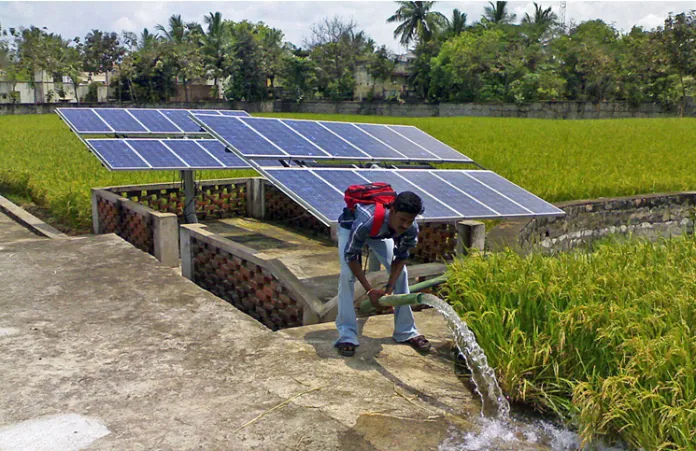
Contents
In the beginning,
Agriculture serves as the foundation of the economy in Pakistan, as it is responsible for employing a sizeable section of the labor force and makes a sizeable contribution to the country’s gross domestic product. On the other hand, the high prices and inefficiency of existing energy sources significantly complicate the task of efficient water management, which is crucial for agricultural productivity. Solar energy Water management systems can incorporate solar energy, offering a potential solution to the identified problems. lar power in Pakistan’s agricultural sector is becoming more recognized as a solution that is both environmentally friendly and economical, with the potential to improve irrigation and guarantee the availability of water.
Solar energy is a sustainable solution for meeting agricultural water requirements.
One of the most important aspects of water management in agriculture is not only the provision of sufficient and timely water but also the enhancement of the effectiveness of water utilization. Solar energy has a significant benefit because of its dependability and long-term viability. Solar system for agriculture in Pakistan have the potential to supply the energy required to run water pumps in areas where electricity is either scarce or expensive. This eliminates the need for diesel fuel, which is expensive on a regular basis, as well as the vast infrastructure that is required for grid electricity.
The functioning of solar water pumps and their mechanisms are explained.
Photovoltaic panels provide the mechanism that allows solar water pumps, which are the fundamental component of solar water management systems, to function. These panels convert sunlight into electricity, which then powers pumps that extract water from wells, rivers, or lakes. As a result of Pakistan’s adoption of solar systems for agriculture, farmers in even the most remote areas now have access to a dependable water source for irrigation purposes. In addition to assisting in water management in a more efficient manner, this technology also helps to lessen the reliance on unpredictable patterns of rainfall.
In the field of agriculture, solar systems are a cost-effective solution.
The huge reduction in prices is one of the most compelling reasons for Pakistan’s adoption of solar systems for agricultural use. While the initial installation costs of a solar system may surpass those of conventional energy sources, the long-term savings can be significant. Solar energy systems do not require fuel, have lower operating costs, and have minimum maintenance requirements. The potential for these savings to accumulate over time can be enormous, which makes solar energy a financially viable choice for farmers in Pakistan.
The impact on water usage and crop yields is significant.
Pakistan has demonstrated a favorable impact on crop production and water utilization efficiency through the implementation of a solar system for agricultural purposes. Farmers are able to reduce water waste and ensure optimal growth for their crops by using more dependable and controlled irrigation methods. This not only results in increased crop yields, but it also encourages the conservation of water resources, which is of utmost importance in regions of Pakistan that experience water scarcity.
The system is facing difficulties in its adoption and implementation.
Despite the numerous benefits, Pakistan’s agricultural sector must overcome a number of obstacles before widely implementing solar energy. Among these are the high initial investment, the lack of awareness among farmers, and the restricted access to various financing options. Furthermore, the technical know-how required for the installation and maintenance of solar systems is not generally available, which could be a barrier to their efficient use.
The government conducts initiatives and provides policy support.
Recognizing the potential of solar energy to increase agricultural output, Pakistan’s government has launched a number of programs to encourage the use of solar systems for agricultural purposes. The government provides a range of financial incentives and subsidies to ease the initial costs. Additionally, we conduct training programs to educate farmers about the benefits of solar systems and the necessary maintenance, ensuring their sustainable adoption.
We refer to success stories from the field as case studies.
Numerous success stories documented across Pakistan demonstrate the benefits of solar systems in improving agricultural methods. For example, in the province of Punjab, a project involving irrigation pumps powered by solar energy resulted in a significant increase in agricultural output as well as enhanced profitability for the local farmers. These success stories not only serve as a source of motivation for other farmers, but they also offer useful models and insights into the processes involved in the adoption of solar systems for agricultural purposes in Pakistan.
Agriculture in Pakistan: What the Future Holds for Solar Energy
In the coming years, Pakistan expects to expand its use of solar energy for managing water resources for agricultural purposes. It is anticipated that the efficiency of solar panels and pumps will improve as a result of technological advances, which will make them even more appealing to the agricultural sector. Additionally, we anticipate an increasing number of farmers to adopt this environmentally friendly technology as more people become aware of the issue and as more successful implementations come to light.
Final Thoughts
Agricultural practices in Pakistan are undergoing a sea change as a result of the incorporation of solar energy into water management systems. Solar systems for agriculture hold the key to tackling many of the issues that Pakistani farmers are currently facing. These systems offer a solution to irrigation needs that is dependable, cost-effective, and sustainable. Not only does the implementation of solar energy in water management have the potential to boost agricultural output, but it also makes a contribution to Pakistan’s overall economic stability. This is because the country is moving toward more environmentally friendly agricultural methods.